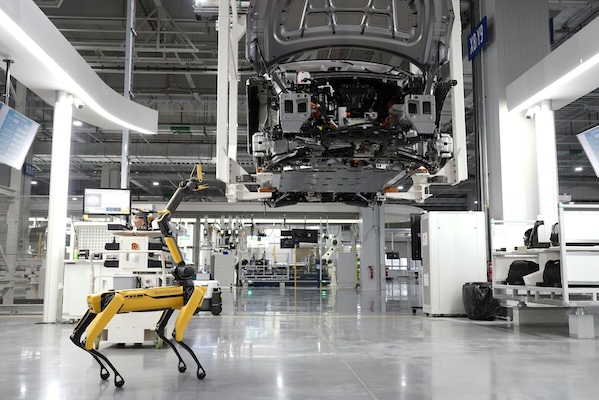Industrial IoT Solutions: Transforming Manufacturing with Smart Technologies and Industry 4.0 Insights

Industrial IoT Solutions: A Complete Guide to Smart Manufacturing and Industry 4.0
The industrial landscape is undergoing a dramatic transformation through Industrial IoT solutions – networks of interconnected devices that are revolutionizing manufacturing and industrial processes. As factories become smarter and operations more data-driven, understanding these solutions is crucial for staying competitive in today’s market.
From smart factory automation to IIoT for manufacturing, these technologies are reshaping how industries operate, monitor processes, and maintain equipment. Let’s dive deep into the world of Industrial IoT and explore how it’s creating more efficient, productive, and intelligent industrial environments.
Estimated Reading Time: 9 minutes
Key Takeaways
- Discover the core components and infrastructure of Industrial IoT solutions.
- Understand the transformation of manufacturing processes through IIoT for Manufacturing.
- Explore the benefits of smart factory automation and process monitoring.
- Learn about IoT-enabled predictive maintenance and its impact on equipment upkeep.
- Gain insights into the challenges and future trends within Industrial IoT.
Table of Contents
Understanding Industrial IoT Solutions
Industrial IoT (IIoT) represents a sophisticated network of interconnected devices, sensors, instruments, and software working together to enhance industrial applications. This technological ecosystem forms the backbone of modern smart manufacturing and Industry 4.0 initiatives.
Key components of Industrial IoT solutions include:
- Smart sensors and actuators for data collection
- Edge computing devices for local processing
- Cloud platforms for data storage and analysis
- Advanced analytics and AI systems
- Secure connectivity infrastructure
- Industrial control systems
These components work together to create a comprehensive digital nervous system for industrial operations. For instance, deploying a specialized industrial router like the Teltonika RUTX09 Industrial or Vehicle Gateway Router can provide robust and reliable connectivity for real-time data transfer in IIoT settings. Learn more about Industrial IoT.
IIoT for Manufacturing
In the manufacturing sector, IIoT is transforming traditional production processes into smart, connected operations. This digital transformation enables manufacturers to:
- Monitor production in real-time
- Optimize supply chains dynamically
- Automate quality control processes
- Track assets efficiently
- Manage energy consumption
These capabilities lead to increased productivity, reduced operational costs, and improved product quality through data-driven decision-making. Explore IoT in Manufacturing.
Smart Factory Automation
Smart factory automation represents the pinnacle of Industrial IoT implementation. These advanced manufacturing environments integrate cutting-edge technologies to create highly efficient and adaptable production systems.
Key features include:
- Autonomous robots and collaborative robots (cobots)
- Adaptive manufacturing systems
- Digital twins for process simulation
- AI-powered quality control
- Automated material handling
These technologies work in concert to create flexible, efficient production environments that can quickly adapt to changing market demands. Learn more about Smart Factory Automation.
Industrial Process Monitoring
Effective industrial process monitoring is essential for maintaining operational excellence. IIoT-enabled monitoring systems provide:
- Real-time process visibility
- Early detection of anomalies
- Quality control automation
- Environmental monitoring
- Safety system integration
These capabilities ensure consistent product quality while minimizing waste and maximizing efficiency. Explore Industrial IoT Benefits.
IoT-enabled Predictive Maintenance
Predictive maintenance powered by IoT technology is revolutionizing equipment upkeep practices. This approach uses:
- Real-time condition monitoring
- Performance trend analysis
- Failure prediction algorithms
- Maintenance scheduling optimization
- Asset lifecycle management
The result is reduced downtime, lower maintenance costs, and extended equipment life. Ensuring stable data exchange for these processes can be supported by industrial-grade connectivity solutions like the Teltonika RUT241 Compact Industrial Router. Learn about IIoT security challenges.
Benefits of Implementing Industrial IoT Solutions
The implementation of Industrial IoT solutions delivers multiple advantages:
Operational Excellence:
- Increased productivity and efficiency
- Reduced operational costs
- Improved quality control
- Enhanced safety measures
Business Impact:
- Data-driven decision making
- Improved customer satisfaction
- Faster time to market
- Greater competitive advantage
Resource Optimization:
- Reduced energy consumption
- Minimized material waste
- Optimized workforce utilization
- Better asset management
Challenges and Considerations
While implementing Industrial IoT solutions, organizations must address several challenges:
Security Concerns:
- Cybersecurity threats
- Data privacy issues
- Network vulnerability
Implementation Hurdles:
- Integration with legacy systems
- Initial investment costs
- Technical expertise requirements
- Change management
To overcome these challenges, organizations should:
- Develop comprehensive security strategies
- Plan phased implementations
- Invest in workforce training
- Partner with experienced solution providers
Future Trends in Industrial IoT
The evolution of Industrial IoT continues with emerging trends:
Technology Advancement:
- 5G network integration
- Edge AI capabilities
- Expanded use of digital twins
- Blockchain integration
- Augmented reality applications
Industry Impact:
- Greater automation capability
- Enhanced real-time analytics
- Improved decision-making
- More flexible manufacturing
- Sustainable operations
Conclusion
Industrial IoT solutions are fundamentally transforming industrial operations, creating smarter, more efficient, and more responsive manufacturing environments. As technology continues to evolve, the possibilities for industrial optimization and innovation grow exponentially.
For organizations looking to remain competitive in the modern industrial landscape, embracing Industrial IoT solutions is no longer optional – it’s imperative. The journey to digital transformation may be complex, but the benefits of increased efficiency, reduced costs, and improved operations make it worthwhile.
Additional Resources
To learn more about implementing Industrial IoT solutions:
- Visit industry-specific technology forums
- Attend manufacturing technology conferences
- Consult with IIoT solution providers
- Join industrial automation communities
- Access online training resources
For specific implementation guidance or to discuss your Industrial IoT needs, contact industrial automation experts or schedule a consultation with experienced solution providers in your industry.